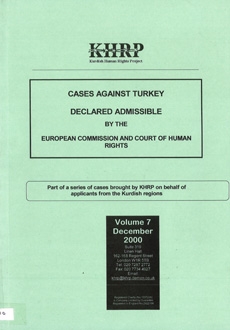|
1. INTRODUCTION BY THE EXECUTIVE DIRECTOR
The year 1999 and the early months of 2000 saw an acceleration of KHRP cases working their way through the Strasbourg system. From the beginning of 1999 through March of 2000, admissibility decisions were made in twelve KHRP cases. This volume reproduces these twelve admissibility decisions, plus an earlier decision from 30 June 1997 which was not included in earlier volumes.
This volume also contains an update on other KHRP-assisted cases and tracks their progress through the Strasbourg system. This includes descriptions of decisions of the Commission on Human Rights on the merits, cases referred to the European Court of Human Rights and hearings attended by the KHRP legal team. Also included are a summary of judgments handed down in nine KHRP cases during the period, among them two key freedom of expression judgments (Ocgiir Giindem v. Turkey, Kilic v. Turkey) which have struck deep at the heart of the Turkish legal system.
A comprehensive schedule of all KHRP cases to July 2000, together with extensive analysis, is included in KHRP’s publication Turkey and the European Convention on Human Rights: A Report on the Litigation Programme of the Kurdish Human Rights Project by Carla Buckley, available from KHRP.
These cases are brought as part of KHRP’s Litigation and Training project, which since 1992 has assisted over 400 applicants to bring their cases to the European Commission and Court of Human Rights against Turkey in respect of violations of the Convention. This case report is part of a series entitled Cases Against Turkey Declared Admissible,1 2 2 and KHRP also publishes a separate series of judgments of the Court in addition to analytical and thematic reports.
The judgments of the European Court represent the end of a long road for the applicants in all cases. These judgments are an important vindication of the rights of the individual applicants who persisted in seeking justice before the Strasbourg organs often in the face of pressure and intimidation from Turkish authorities. Just as significant is the effect of these judgments more generally on the overall human rights situation in Turkey. One of the important results of the judgments has been to create greater international awareness of the human rights situation in Turkey and also to stimulate debate on the ground regarding the issues surrounding the applicants' complaints. However, the full impact of the cases will only become clear over time and will require careful monitoring.
As can be seen in the chart summarising the European Convention process, which is contained in Appendix A of this report, the first important decision reached in each case is the finding as to the admissibility of each complaint. This volume contains 13 cases, which have been declared admissible or partially admissible by the Commission and Court from the beginning of 1999 to the end of March 2000. It also contains updates on other KHRP cases and on cases not assisted by KHRP, in Appendices C, D and E, and in Appendix A, an outline of the new system and procedure at the European Court of Human Rights under Protocol 11, in effect since 1 November 1998.
The finding of admissibility is important, not least because it allows the case to proceed for fuller consideration by the European Court; but especially because by finding the case admissible the Commission or Court is saying that the allegations made are not “manifestly ill-founded”. In addition, before an application is declared admissible, applicants must show that they have exhausted all available domestic remedies, or, alternatively, that the available remedies were ineffective.
The ineffectiveness of domestic remedies is one of the key complaints in each of the cases included in this volume. It is argued not only as a procedural issue so as to permit a finding of admissibility, but also as a substantive complaint. The failure to provide a system which punishes those responsible for torture, unlawful killings and the wanton destruction of homes and communities and the failure to provide a remedy are violations in themselves and constitute serious problems which must be overcome if Turkey’s human rights situation is to improve.
Despite signs of improvement in the law in Turkey, gross violations of rights continue to occur as a matter of practice in Southeast Turkey. The Kurdish Human Rights Project will continue to assist individuals who wish to pursue their cases before the European Court of Human Rights as a means of promoting the rule of law and ensuring accountability of state agents in Turkey.
Finally, the Kurdish Human Rights Project wishes to thank the many individuals and organisations who, through their support and assistance, have made this work possible, Paul Richmond and Nusrat Chagtai who drafted this report, and the funders without whose generosity our achievements would not be possible.
Kerim Yildiz
Executive Director
December 2000
| 